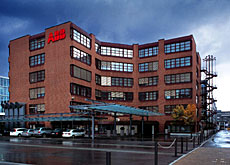ABB posts worse-than-expected loss

The heavily indebted engineering firm, ABB, has reported a third-quarter net loss of $279 million (SFr369 million) - much worse than the $5 million loss forecast by analysts.
The Swiss-Swedish group added that the key sale of its Oil, Gas and Petrochemicals (OGP) business could be delayed.
The sale is at the centre of ABB’s promise to its creditors that it would reduce debt before the end of 2003.
ABB said it had reached a preliminary agreement to sell most of the unit to United States investment bank, JP Morgan, and the British firms 3i Group and Candover in a deal worth $925-975 million. The money would be used to retire short-term debt.
However, completion of the deal is subject to a legal compliance review, centering on improper payments from the unit to three countries in Africa, Asia and South America.
ABB announced on Tuesday that it would not meet a promise to its creditors to reduce debt by around $2 billion to $6.5 billion by the end of the year. It said debt was now likely to stand at $7.3 billion.
The company also presented a three-part financing programme to strengthen its balance sheet and to create a platform to secure its future business success.
“The time has come for ABB to take the next step along the road to long-term profitable growth,” said company chairman and chief executive Jürgen Dormann.
During a conference call he said that the new financing plan would meet ABB’s needs through to 2006. “We are at the end of the tunnel,” he said.
The programme involves issuing 1.2 billion new shares to increase the company’s share capital to the equivalent of $2.5 billion.
New credit facility
The Zurich-based company also said it would launch a bond worth some €650 million, and announced a new $1 billion standby credit facility to help put its finances on a sounder footing.
“The capital issue is much more than I expected,” said Bank Leu analyst Patrick Appenzeller. “This will lead to a big dilution although in the long term it will better their balance sheet.”
Chief financial officer Peter Voser insisted the firm would return to profit next year, as ABB continued its turnaround.
“I think it’s safe to say – excluding major capital losses on divestments – the core divisions plus non-core plus corporate will certainly lead us to a profit,” he said.
Close to collapse
Having almost collapsed last year amid the global downturn, ABB has shown signs of becoming one of 2003’s most talked-about recovery stories.
Many analysts were poised to write the company off after it issued a series of bleak profit warnings in 2002, and recorded a $787 million loss.
Struggling to cope with debts accrued during the late 1990s boom years, ABB’s newly appointed management – headed by Dormann – last year embarked on an extensive cost-cutting plan.
Still underway, the plan includes reducing the firm’s global workforce to below 100,000 from a peak of 140,000.
Dormann’s strategy has also centred on returning the company to its core strengths – making products for electrical transmission systems (such as power-grid components) and robotics.
That has meant selling off unwanted assets.
Investor interest
ABB has also raised more than SFr1 billion in a convertible bond issue – a move considered unthinkable six months ago and a sign that investor confidence is returning.
The company received a further boost during the summer after a US court accepted a $1.2 billion asbestos settlement for former workers at the ABB subsidiary, Combustion Engineering.
The decision limited potentially ruinous claims against other ABB divisions, including OGP.
ABB stock has tripled since March on hopes that the worst is behind it but has come under pressure recently as appeals against the asbestos settlement drag on in the courts.
The company said on Tuesday that it was confident the asbestos deal would go ahead.
ABB hopes to raise another $500 million by selling off other non-core divisions – including holdings in power plants and infrastructure projects around the world – before the end of the year.
swissinfo, Jacob Greber in Zurich
ABB was formed in 1988 by the merger of Sweden’s Asea and Brown Boveri of Switzerland.
The company announced a financing programme to strengthen its balance sheet.
It involves issuing 1.2 billion new shares, worth around $2.5 billion.
The firm said it would not be able to reduce debt by around $2 billion, as promised.
Group sales came in at $4.8 billion.
The troubled Swiss-Swedish engineering firm has posted a loss of $279 million (SFr369 million), far in excess of analysts’ expectations.
The company posted a loss of $148 million for the corresponding period last year.
In 2002 ABB reported a record loss of $783 million, with sales amounting to $18.3 billion.
ABB is hoping to sell its Oil, Gas and Petrochemicals business to a syndicate in a deal worth $925-975 million.

In compliance with the JTI standards
More: SWI swissinfo.ch certified by the Journalism Trust Initiative











You can find an overview of ongoing debates with our journalists here . Please join us!
If you want to start a conversation about a topic raised in this article or want to report factual errors, email us at english@swissinfo.ch.